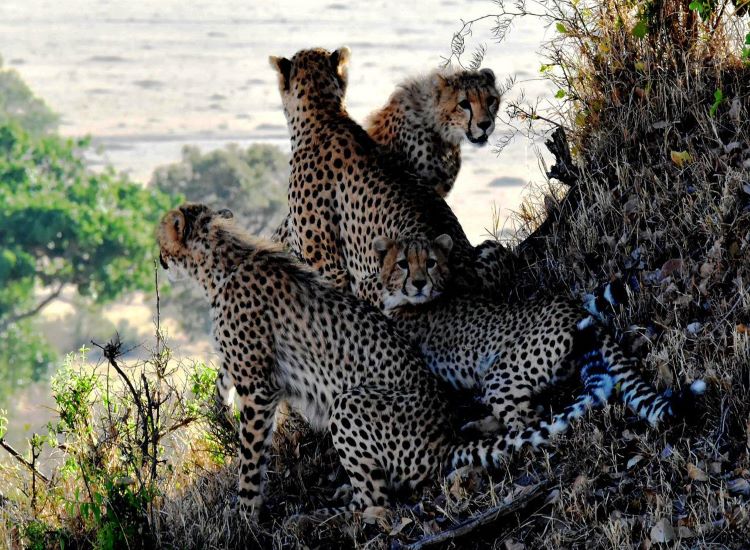
South Africa translocates 12 cheetahs to India in a cooperation agreement
Cape Town/IBNS: Twelve cheetahs will later today (Friday) depart from South Africa for India, the South African government said.
The cheetahs will be translocated to India as part of an initiative to expand the cheetah meta-population and to reintroduce cheetahs to a former range state following their local extinction due to overhunting and loss of habitat in the last century, the Department of Forestry, Fisheries and the Environment of South Africa said.
These cheetahs will join eight of the mammals relocated to India’s Kuno National Park from Namibia in September 2022.
Earlier this year, the governments of South Africa and India signed a Memorandum of Understanding (MoU) on Cooperation on the Re-introduction of Cheetah to India.
The MoU facilitates cooperation between the two countries to establish a viable and secure cheetah population in India; promotes conservation and ensures that expertise is shared and exchanged, and capacity is built, to promote cheetah conservation.
This includes human-wildlife conflict resolution, capture and translocation of wildlife and community participation in conservation in the two countries.
“Conservation translocations have become a common practice to conserve species and restore ecosystems. South Africa plays an active role in providing founders for the population and range expansion of iconic species such as cheetahs,” the statement said.
South Africa’s Minister of Forestry, Fisheries and the Environment, Barbara Creecy said, “It is because of South Africa’s successful conservation practices that our country is able to participate in a project such as this - to restore a species in a former range state and thus contribute to the future survival of the species.”
The Cheetah, Acinonyx jubatus, is the world’s fastest mammal, and is endemic to the savannahs of Africa.
While southern Africa is the cheetah’s regional stronghold, it is considered to be a vulnerable under the Convention on International Trade in Endangered Species of Wild Fauna and Flora (CITES) and is listed in Appendix I.
The cheetah was declared extinct in India in 1952.
Restoring cheetah populations is considered by India to have vital and far-reaching conservation consequences, which would aim to achieve a number of ecological objectives, including re-establishing the function role of cheetah within their historical range in India and improving the enhancing the livelihood options and economies of the local communities.
Following the import of the 12 cheetahs in February, the plan is to translocate a further 12 annually for the next eight to 10 years.
Scientific assessments will be undertaken periodically to inform such translocations.
Worldwide, cheetah numbers have declined from an estimated 15000 adults in 1975 to a current global population of less than 7000 individuals, the statement said.
In South Africa, the transition to democracy had substantial implications for wild cheetah conservation. The Game Theft Act (No. 105 of 1991) was responsible for a major change in land use from agriculture to ecotourism.
Since 1994 cheetahs have been reintroduced into 63 newly established game reserves that currently support a combined metapopulation of 460 individuals.
The Department of Fisheries, Forestry and the Environment has approved the export of up to 29 wild cheetahs per annum to support conservation efforts for the species outside of the country, the statement read.
Concerted efforts were made to select the best possible cheetah for the reintroduction effort.
All 12 cheetahs are wild born, and have grown up amongst competing predators including lions, leopards, hyenas and wild dogs.
They are considered predator savvy and should respond appropriately when they encounter a new predator guild in India that includes tigers, leopards, wolves, dholes, striped hyenas, and sloth bears.
According to the statement, Phinda Game Reserve, Tswalu Kalahari Reserve, and the Waterberg Biosphere made available three cheetahs each while Kwandwe Game Reserve provided two and Mapesu Game Reserve gave one cheetah for translocation to India.
“Their translocation is in line with IUCN Guidelines for Reintroductions and Other Conservation Translocation and in accordance with international veterinary standards and protocols,” it added.
Support Our Journalism
We cannot do without you.. your contribution supports unbiased journalism
IBNS is not driven by any ism- not wokeism, not racism, not skewed secularism, not hyper right-wing or left liberal ideals, nor by any hardline religious beliefs or hyper nationalism. We want to serve you good old objective news, as they are. We do not judge or preach. We let people decide for themselves. We only try to present factual and well-sourced news.







